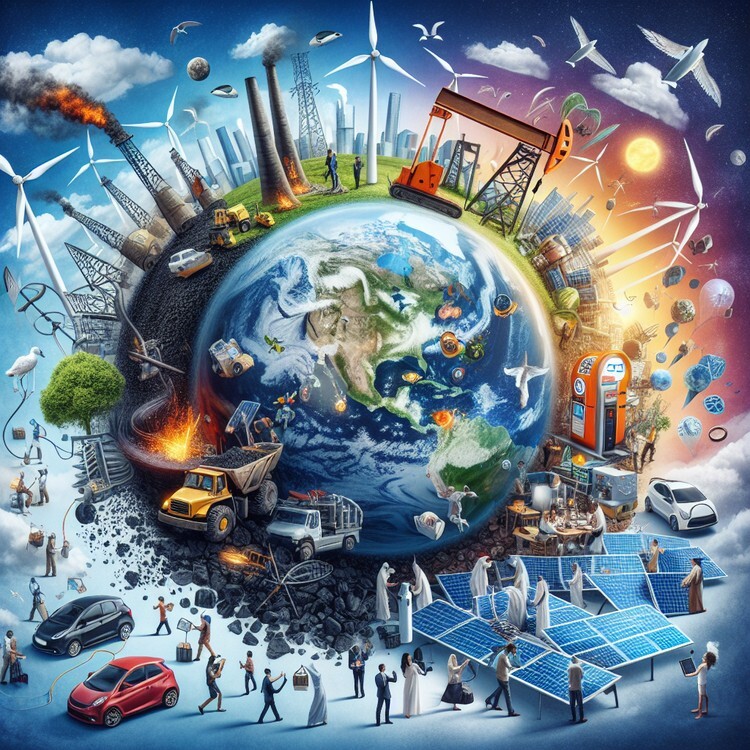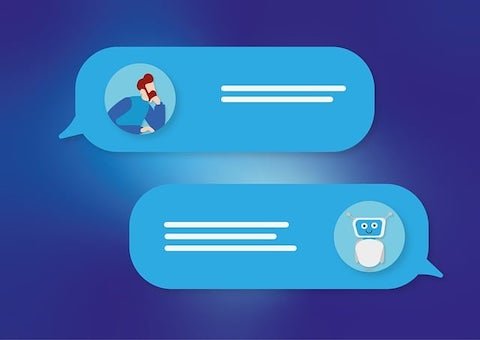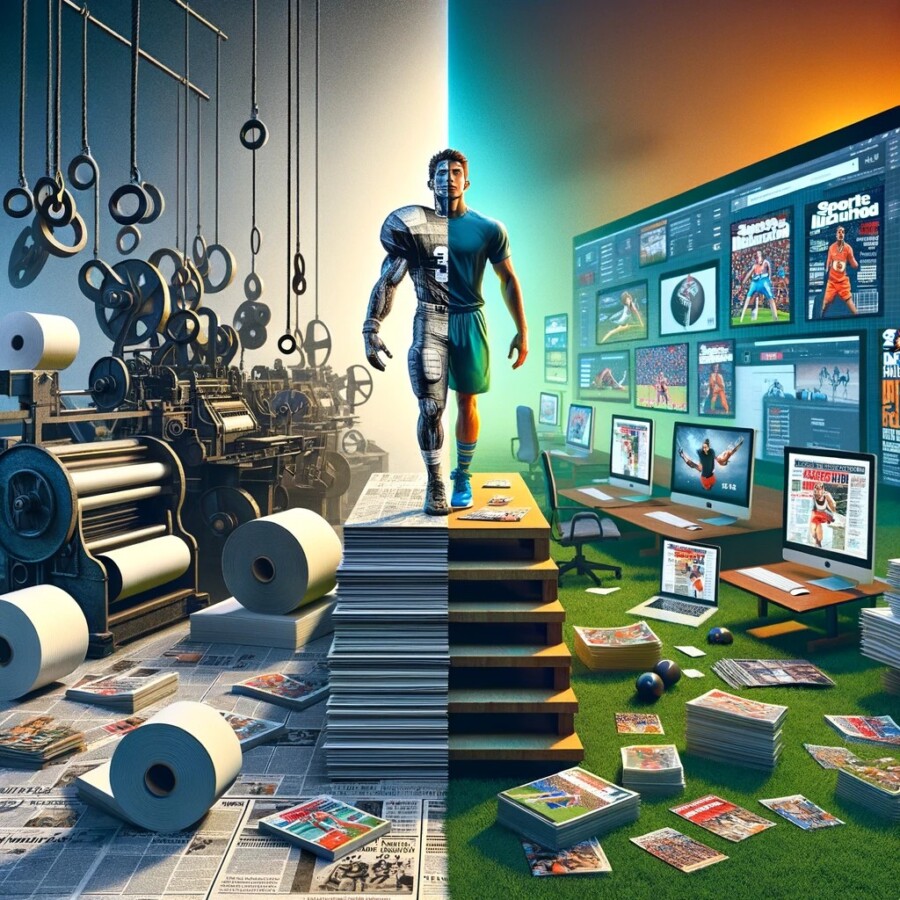The world is getting close to using up all its fossil fuels. This means that soon we won’t need as much coal, oil, and gas anymore. It’s a big deal, but it also means we have to figure out how to switch to clean energy quickly so we don’t harm the Earth even more. The UN climate conference in Dubai is all about finding solutions to these challenges.
Experts think that by 2025, we will reach a point where we won’t need as much fossil fuel anymore, even without new climate policies. This is a really important moment, according to the International Energy Agency. But it won’t be easy to stop using fossil fuels. Energy is really important for our economy and our daily lives. We use a lot of energy for things like making steel, producing cement, and making fuel. It’s a huge amount.
In the past, people lived in poverty and had to work really hard. But when we discovered coal, oil, and gas, things changed. We had a big economic boom and our lives got better. Now, we need to find a way to use renewable energy instead. Wind and solar power are growing, but they only make up a small part of our energy supply. Most of our energy still comes from fossil fuels.
The key to using less fossil fuel is to use electricity for everything. Electric devices are more efficient and use less energy than ones that run on fossil fuels. Renewable electricity is also getting cheaper, which will save us money in the long run. It’s important for private companies to invest in renewable energy, rather than relying on the government. But it can be hard for poorer countries to afford the upfront costs. We’re working on finding ways to help them get the money they need to switch to renewable energy.
Original news source: Fossil fuels: Can humanity really kick its addiction? (BBC)
🎧 Listen:
Slow
Normal
Fast
📖 Vocabulary:
| 1 | fossil fuels | Energy sources like coal, oil, and gas that were formed from ancient plants and animals |
| 2 | climate | The weather conditions that are typical in an area over a long period |
| 3 | renewable | Able to be replaced naturally and used again, like wind or sunlight for power |
| 4 | economy | The system of how money is made and used within a particular country or region |
| 5 | poverty | The state of being very poor and not having the basic necessities of life |
| 6 | cement | A gray powder that is mixed with water and other substances to make concrete |
| 7 | efficient | Doing something or working in a way that doesn’t waste time or resources |
| 8 | upfront | Costs or payments that need to be paid before something can be done |
| 9 | invest | To put money into something with the expectation that it will grow or earn more money |
| 10 | solar | Energy that comes from the sun |
| 11 | reliance | Depending on someone or something for support or help |
| 12 | conference | A large meeting where people discuss a particular topic |
| 13 | switch | To change from one thing to another |
| 14 | challenges | Difficult tasks or problems that need to be dealt with |
| 15 | boom | A period of rapid growth and success in business or the economy |
Group or Classroom Activities
Warm-up Activities:
– News Summary
Instructions: In pairs, students will read the article and write a summary of the main points. They can then share their summaries with another pair and compare their answers.
– Opinion Poll
Instructions: Divide the class into small groups. Each group will come up with a question related to the article and create an opinion poll. They will then go around the class, asking other groups their question and recording their responses. They can then analyze and discuss the results as a class.
– Vocabulary Pictionary
Instructions: Give each student a vocabulary word from the article. They will then draw a picture to represent the word and try to get their classmates to guess what the word is. This can be done individually or in small groups.
– Pros and Cons
Instructions: Divide the class into two groups. One group will list the pros of switching to clean energy, while the other group will list the cons. Each group will then present their lists to the class and have a debate on the topic.
– Future Predictions
Instructions: In pairs, students will discuss and make predictions about what they think the future of energy will look like. They can use the information from the article as well as their own ideas. Afterward, they can share their predictions with the class and discuss as a group.
🤔 Comprehension Questions:
1. What is the main topic of the article?
2. Why is it important to switch to clean energy quickly?
3. According to experts, when do they predict that we won’t need as much fossil fuel anymore?
4. Why is it difficult to stop using fossil fuels?
5. How did the discovery of coal, oil, and gas change people’s lives?
6. What are two examples of things that require a lot of energy?
7. Why is using electricity for everything key to using less fossil fuel?
8. Why can it be difficult for poorer countries to switch to renewable energy?
Go to answers ⇩
🎧✍️ Listen and Fill in the Gaps:
The world is getting (1)______ to using up all its fossil fuels. This means that soon we won’t need as much coal, oil, and gas anymore. It’s a big deal, but it also means we have to figure out how to switch to (2)______ energy quickly so we don’t harm the Earth even more. The UN climate conference in Dubai is all about finding solutions to these (3)______.
Experts (4)______ that by 2025, we will reach a point where we won’t need as much fossil fuel anymore, even without new climate policies. This is a really important moment, according to the (5)______ Energy Agency. But it won’t be easy to stop using fossil (6)______. Energy is really important for our economy and our daily lives. We use a lot of energy for things like (7)______ steel, producing cement, and making fuel. It’s a huge amount.
In the past, (8)______ lived in poverty and had to work really hard. But when we (9)______ coal, oil, and gas, things changed. We had a big economic boom and our lives got better. Now, we need to find a way to use renewable energy instead. Wind and solar (10)______ are growing, but they only make up a small part of our energy supply. Most of our energy still (11)______ from (12)______ fuels.
The key to using less fossil fuel is to use electricity for everything. Electric devices are more efficient and use less (13)______ than ones that run on fossil fuels. Renewable electricity is also getting cheaper, which will save us money in the long run. It’s (14)______ for private companies to invest in renewable energy, rather than relying on the government. But it can be hard for poorer countries to (15)______ the upfront costs. We’re working on finding ways to help them get the money they need to (16)______ to renewable energy.
Go to answers ⇩
💬 Discussion Questions:
Students can ask a partner these questions, or discuss them as a group.
1. What is a fossil fuel?
2. How would you feel if you had to switch to using only renewable energy?
3. Do you like the idea of using electricity for everything? Why or why not?
4. Do you think it’s important for private companies to invest in renewable energy? Why or why not?
5. How do you think renewable energy can help save money in the long run?
6. What are some challenges that poorer countries might face when trying to switch to renewable energy?
7. How do you think renewable energy can help the Earth?
8. Do you think wind and solar power are enough to replace fossil fuels completely? Why or why not?
9. How do you think the discovery of coal, oil, and gas changed people’s lives?
10. What are some ways we can reduce our energy consumption?
11. How do you think the UN climate conference can help find solutions to the challenges of using clean energy?
12. Do you think it’s fair for wealthier countries to help poorer countries afford the upfront costs of switching to renewable energy? Why or why not?
13. How would you feel if you had to live without electricity?
14. What are some benefits of using renewable energy?
15. Do you think it’s possible for the world to completely stop using fossil fuels? Why or why not?
Individual Activities
📖💭 Vocabulary Meanings:
Match each word to its meaning.
Words:
1. fossil fuels
2. climate
3. renewable
4. economy
5. poverty
6. cement
7. efficient
8. upfront
9. invest
10. solar
11. reliance
12. conference
13. switch
14. challenges
15. boom
Meanings:
(A) Able to be replaced naturally and used again, like wind or sunlight for power
(B) A gray powder that is mixed with water and other substances to make concrete
(C) To put money into something with the expectation that it will grow or earn more money
(D) Costs or payments that need to be paid before something can be done
(E) Energy sources like coal, oil, and gas that were formed from ancient plants and animals
(F) Doing something or working in a way that doesn’t waste time or resources
(G) Depending on someone or something for support or help
(H) Difficult tasks or problems that need to be dealt with
(I) To change from one thing to another
(J) A large meeting where people discuss a particular topic
(K) The state of being very poor and not having the basic necessities of life
(L) The weather conditions that are typical in an area over a long period
(M) A period of rapid growth and success in business or the economy
(N) The system of how money is made and used within a particular country or region
(O) Energy that comes from the sun
Go to answers ⇩
🔡 Multiple Choice Questions:
1. What is the main topic of the article?
(a) The world’s decreasing fossil fuel supply and the need for clean energy
(b) The economic benefits of using fossil fuels
(c) The UN climate conference in Dubai
(d) The challenges of using renewable energy
2. When do experts predict that we will no longer need as much fossil fuel?
(a) By 2030
(b) By 2050
(c) By 2025
(d) By 2100
3. Why is it important to switch to clean energy quickly?
(a) To save money in the long run
(b) To rely less on the government
(c) To prevent further harm to the Earth
(d) To increase the use of electric devices
4. Which energy sources currently make up a small part of our energy supply?
(a) Coal and oil
(b) Wind and solar power
(c) Gas and cement
(d) Steel and fuel
5. What is the key to using less fossil fuel?
(a) Investing in renewable energy
(b) Using electricity for everything
(c) Finding ways to help poorer countries
(d) Decreasing the upfront costs of renewable energy
6. Why did people’s lives improve when coal, oil, and gas were discovered?
(a) They no longer had to work hard
(b) They had more money to spend
(c) They had access to more energy
(d) They could afford renewable energy
7. What is the main challenge in switching to renewable energy?
(a) The lack of available renewable energy sources
(b) The government’s reliance on fossil fuels
(c) The inefficiency of electric devices
(d) The upfront costs for poorer countries
8. Who should invest in renewable energy, according to the article?
(a) The government
(b) Wealthy individuals
(c) All citizens of a country
(d) Private companies
Go to answers ⇩
🕵️ True or False Questions:
1. Renewable energy sources like wind and solar power currently make up a small part of our energy supply.
2. It can be effortless for poorer countries to afford the upfront costs of switching to renewable energy, but efforts are not being made to find solutions.
3. Using electricity for everything and investing in renewable energy can help reduce our reliance on fossil fuels.
4. The UN climate conference in Dubai is not focused on finding solutions to the challenge of transitioning to clean energy.
5. The world is running out of fossil fuels, such as coal, oil, and gas.
6. Energy is used for unimportant things like making steel, producing cement, and making fuel.
7. Experts predict that by 2025, we will not reach a point where we won’t need as much fossil fuel, even without new climate policies.
8. It will be difficult to stop using fossil fuels because they are essential for our economy and daily lives.
Go to answers ⇩
📝 Write a Summary:
Write a summary of this news article in two sentences.
Writing Questions:
Answer the following questions. Write as much as you can for each answer.
1. What is the main problem that the world is facing with regards to fossil fuels?
2. Why is it important to switch to clean energy quickly?
3. When do experts predict that we won’t need as much fossil fuel anymore?
4. Why is it difficult to stop using fossil fuels?
5. What are some examples of how we use a lot of energy in our daily lives?
✅ Answers
🤔✅ Comprehension Question Answers:
1. What is the main topic of the article?
The main topic of the article is the need to switch to clean energy as the world is running out of fossil fuels.
2. Why is it important to switch to clean energy quickly?
It is important to switch to clean energy quickly to prevent further harm to the Earth and to find sustainable alternatives as fossil fuels are being depleted.
3. According to experts, when do they predict that we won’t need as much fossil fuel anymore?
Experts predict that by 2025, we will reach a point where we won’t need as much fossil fuel anymore, even without new climate policies.
4. Why is it difficult to stop using fossil fuels?
It is difficult to stop using fossil fuels because energy is essential for our economy and daily lives. Fossil fuels are used for various purposes, such as making steel, producing cement, and making fuel, and finding alternative sources of energy can be challenging.
5. How did the discovery of coal, oil, and gas change people’s lives?
The discovery of coal, oil, and gas brought about a big economic boom and improved people’s lives. It provided a source of energy that made life easier and more comfortable.
6. What are two examples of things that require a lot of energy?
Two examples of things that require a lot of energy are making steel and producing cement.
7. Why is using electricity for everything key to using less fossil fuel?
Using electricity for everything is key to using less fossil fuel because electric devices are more efficient and use less energy compared to devices that run on fossil fuels. By relying more on renewable electricity, we can reduce our dependence on fossil fuels.
8. Why can it be difficult for poorer countries to switch to renewable energy?
It can be difficult for poorer countries to switch to renewable energy because they may not have the financial resources to afford the upfront costs of investing in renewable energy infrastructure.
Go back to questions ⇧
🎧✍️✅ Listen and Fill in the Gaps Answers:
(1) close
(2) clean
(3) challenges
(4) think
(5) International
(6) fuels
(7) making
(8) people
(9) discovered
(10) power
(11) comes
(12) fossil
(13) energy
(14) important
(15) afford
(16) switch
Go back to questions ⇧
📖💭✅ Vocabulary Meanings Answers:
1. fossil fuels
Answer: (E) Energy sources like coal, oil, and gas that were formed from ancient plants and animals
2. climate
Answer: (L) The weather conditions that are typical in an area over a long period
3. renewable
Answer: (A) Able to be replaced naturally and used again, like wind or sunlight for power
4. economy
Answer: (N) The system of how money is made and used within a particular country or region
5. poverty
Answer: (K) The state of being very poor and not having the basic necessities of life
6. cement
Answer: (B) A gray powder that is mixed with water and other substances to make concrete
7. efficient
Answer: (F) Doing something or working in a way that doesn’t waste time or resources
8. upfront
Answer: (D) Costs or payments that need to be paid before something can be done
9. invest
Answer: (C) To put money into something with the expectation that it will grow or earn more money
10. solar
Answer: (O) Energy that comes from the sun
11. reliance
Answer: (G) Depending on someone or something for support or help
12. conference
Answer: (J) A large meeting where people discuss a particular topic
13. switch
Answer: (I) To change from one thing to another
14. challenges
Answer: (H) Difficult tasks or problems that need to be dealt with
15. boom
Answer: (M) A period of rapid growth and success in business or the economy
Go back to questions ⇧
🔡✅ Multiple Choice Answers:
1. What is the main topic of the article?
Answer: (a) The world’s decreasing fossil fuel supply and the need for clean energy
2. When do experts predict that we will no longer need as much fossil fuel?
Answer: (c) By 2025
3. Why is it important to switch to clean energy quickly?
Answer: (c) To prevent further harm to the Earth
4. Which energy sources currently make up a small part of our energy supply?
Answer: (b) Wind and solar power
5. What is the key to using less fossil fuel?
Answer: (b) Using electricity for everything
6. Why did people’s lives improve when coal, oil, and gas were discovered?
Answer: (a) They no longer had to work hard
7. What is the main challenge in switching to renewable energy?
Answer: (d) The upfront costs for poorer countries
8. Who should invest in renewable energy, according to the article?
Answer: (d) Private companies
Go back to questions ⇧
🕵️✅ True or False Answers:
1. Renewable energy sources like wind and solar power currently make up a small part of our energy supply. (Answer: True)
2. It can be effortless for poorer countries to afford the upfront costs of switching to renewable energy, but efforts are not being made to find solutions. (Answer: False)
3. Using electricity for everything and investing in renewable energy can help reduce our reliance on fossil fuels. (Answer: True)
4. The UN climate conference in Dubai is not focused on finding solutions to the challenge of transitioning to clean energy. (Answer: False)
5. The world is running out of fossil fuels, such as coal, oil, and gas. (Answer: True)
6. Energy is used for unimportant things like making steel, producing cement, and making fuel. (Answer: False)
7. Experts predict that by 2025, we will not reach a point where we won’t need as much fossil fuel, even without new climate policies. (Answer: False)
8. It will be difficult to stop using fossil fuels because they are essential for our economy and daily lives. (Answer: True)
Go back to questions ⇧












